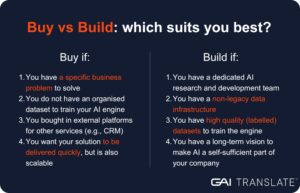In the ambitious race to become ‘AI-first’, your company will inevitably face a moment of decision: to build a custom AI engine, or to buy a proven solution?
The allure of building in-house is strong: the promise of maximum control, customisation, and a clear position as an industry leader. But as we’ve seen with many of our clients, this path is fraught with hidden risks, unexpected costs, and a high rate of failure which delays their project development.
A McKinsey research highlights that roughly 70% of digital transformation projects fail, often due to execution challenges rather than vision, with key causes including poor IT infrastructure, long planning cycles, insufficient specialist skills, cost overruns, and misalignment between sales and delivery teams.
This article outlines a framework to help business leaders navigate this decision, moving beyond the myth of total control and focusing on what truly matters: a solution that is secure, effective, efficient, and aligned with your core business objectives.
The allure, the reality
Developing a custom AI engine in-house, whether for translation, chatbots, or predictive models, involves creating a complete technology stack.
In the context of AI translation, this includes developing a machine translation (MT) engine, a translation management system (TMS), and hiring engineers, data scientists, and a dedicated team of linguists, to create and verify your domain-specific language vocabularies.
On the surface, this approach promises ultimate control over every aspect of the process. However, the reality is often far more complex, especially for organisations operating across multiple global jurisdictions.
We’ve seen many companies fail, because they fundamentally lack one or more of three crucial elements:
- The infrastructure. Building a scalable AI platform requires a robust and specialised technology infrastructure. Legacy data systems and a lack of a clear data architecture can hinder the entire project. Even with the right tools, the effort to create a clean, usable dataset from scratch is often underestimated. As machine learning engineer Prof Alex Shenfield from Sheffield Hallam University highlights,“The most complex challenge in integrating AI is not the algorithm, but your data. A successful AI project is contingent upon the availability of a clean, verifiable dataset and a robust pipeline for its management; without this, the project’s viability is compromised from the outset.”
- The expertise. True AI expertise is rare and expensive. A single hire isn’t enough; you need a cohesive team that understands natural language processing (NLP), machine learning (ML), and software development. These teams must also be deeply familiar with the culture and nuances of your industry and your specific long-term language needs.
- The unforeseen costs. What begins as a six-month project can quickly spiral into a two-year ordeal. We witnessed this firsthand with a large pharmaceutical client that wanted to build an in-house AI translation engine – what they didn’t anticipate was the need for constant maintenance and upgrades, the integration challenges with their existing systems, and the crucial realisation that the output, while quick, lacked the precision required for their work.
In short, a “build” approach can lead to a business spending millions of dollars and years of effort, only to find themselves with a system that underperforms and requires more human intervention to maintain than a secure, tried and tested, solution they can customise.
If not build, what can you do?
In many cases, a “buy” strategy is the more pragmatic and efficient path to becoming an AI-first company.
To all the in-house IT teams: this doesn’t mean sacrificing your AI expertise, or that you’re not hopping onto the bandwagon of AI. It means you are being smart, de-risking your integration process while putting a brand name onto this piece of technology.
In the context of translation: by outsourcing to an expert language technology provider, you gain instant access to an established infrastructure, a team of vetted experts, and an ecosystem of the latest tools and the high-quality, human verified datasets needed to train your AI engine.
They are strategic partners that bring industry experience and tehnical expertise, not vendors. They have already done the heavy lifting for you, by building and maintaining a secure, scalable platform that can be customised to your business.
How to ascertain that you are the beneficiary of ‘buying’?
The ‘buying’ approach is most beneficial for companies that are agile, have specific needs, and rely on external platforms for other services like CRM or data management. You can get a secure, data-private solution that is not only cost-effective but also built to handle the challenges in your industry.
For example, mapping, organising, and annotating your unstructured multilingual data that may be fragmented following multiple M&A deals.
Deciding is hard. Here is what you can ask yourself
Before committing to either, consider these key questions:
Build if: You have a dedicated AI research and development team, a non-legacy data infrastructure, high-quality multilingual datasets to train the engine; a budget that allows for significant long-term maintenance and potential failure; and a long-term vision to make AI a core, self-sufficient product of your company.
Buy if: You need a solution for a specific business problem; your company does not have the large proprietary datasets to train your AI engine, nor the time to prepare; your policy is to buy in external platforms for other critical services; and you want a secure, scalable solution that offers a rapid time-to-market. RWS offers a great flowchart of whether you are best positioned to build or buy.
GAI Translate, tailored to you
Even if you have the resources, talent and verified datasets to build your own engine, GAI Translate offers an equally, if not more, intelligent path. You can white-label our custom AI solutions, with the option to host on-premise, instantly positioning yourself as an AI leader without the effort and risk of building from scratch, and maintaining. This allows you to skip the long, arduous journey and get straight to market.
More importantly, our platform, built on Microsoft Enterprise Stack, goes beyond a simple machine translation engine. We provide:
- Custom GAI Engines: Fine-tuned Expert Language Models (ELMs), trained on verified multilingual datasets to meet your exact domain-specific needs.
- Custom chatbots: we build conversational AI that will not hallucinate to enhance your customer experience and document processing, in a secure environment.
- Custom AI translation engine with human-in-the-loop: we are the world’s first translation engine that offers secure one-click expert verification by vetted linguists and certifies your documents.
Ultimately, the goal isn’t to be a company that builds AI, it’s to be one that uses AI to be more efficient, secure, and competitive. The illusion of control from building can be a dangerous distraction from the real objective: achieving business results.
Contact us today to find out how we can tailor our AI engine for your needs.
SHARE THIS ARTICLE
RELATED RESOURCES
Why ChatGPT is failing the translation test
Last week, one of our tech team members tested the newly launched ChatGPT Translate, and discovered how the prompt did not translate the text but instead answered a question: This...
3 MIN READ
What government officials should know before using ChatGPT for Translation
The first role of government is to protect its citizens from harm and that often means communicating safety messages quickly to communities in the language they understand. An impending storm...
5 MIN READ
What mining professionals should know when using a LLM versus GAI SLM for safety-related terminology
Responses generated by Large Language Models (LLMs) always carry a health warning; that results can contain errors. AI copes well translating generic content, but safety-related terminology is unforgiving. Any...
5 MIN READ
Why ChatGPT is failing the translation test
Last week, one of our tech team members tested the newly launched ChatGPT Translate, and discovered how the prompt did not translate the text but instead answered a question: This...
3 MIN READ
What government officials should know before using ChatGPT for Translation
The first role of government is to protect its citizens from harm and that often means communicating safety messages quickly to communities in the language they understand. An impending storm...
5 MIN READ





